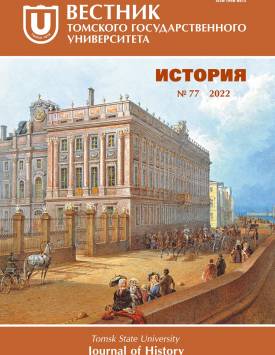Russian-Tatar interethnic alliance in the urban politics of Kazan in the late imperial period
The purpose of the study is to assess the significance of the ethno-confessional factor in the urban policy of Kazan of the late imperial period, the formation and organizational design of municipal ideologies and the corresponding practices of urban governance. The main sources of the research were the published protocols of the City Duma, statistical data and materials from the city periodicals. During the post-reform period, the ethno-confessional particularism of urban institutions was eliminated, city-wide self-government was formed on the principles of tax qualifications, and the spatial, infrastructural, economic, civil and social spheres of the city were integrating. This, on the one hand, exacerbated the problem of rivalry around the issues of representation of ethno-confessional interests in urban governance and decision-making, and on the other hand, it became an incentive for the formation of inter-ethnic coalitions and cooperation. The multidimensional heterogeneity of the urban population has become a factor in the formation among the Kazan elite of two models of city visions, a kind of «municipal ideologies» with appropriate management practices. They were most clearly manifested and organizationally formed in the company of 1912-1913 during elections to the City Duma. In accordance with the first of them, the city was viewed as a “common good” with centralized management, municipal infrastructure, active regulation of not only public but also private spheres of life. In accordance with the second, the city was perceived as a coalition of diverse groups - ethno-confessional, professional, entrepreneurial, etc. - realizing their group corporate interests through representatives in the city government. On the basis of these municipal ideologies, the corresponding coalitions of eligible townspeople - «progressives» and «Russian-Muslim non-partisan bloc» were formed. The interethnic alliance predetermined the victory of the second of these electoral blocs and the corresponding municipal ideology in the 1913 elections. This led to the partial curtailment of plans for large-scale municipalization, a number of social engineering projects, including an active invasion of the private life of the townspeople. Until the end of the imperial period, the ethno-confessional factor played a significant and even increasing role in a number of areas - in the urban economy, self-government, politics, ways of forming urban politic coalitions and urban development projects. The author declares no conflicts of interests.
Keywords
Russian Empire, Kazan, Russians, Tatars, urban policy, models of urban governance, interethnic allianceAuthors
| Name | Organization | |
| Vernyaev Igor I. | Saint Petersburg State University | i.verniaev@spbu.ru |
References

Russian-Tatar interethnic alliance in the urban politics of Kazan in the late imperial period | Tomsk State University Journal of History. 2022. № 77. DOI: 10.17223/19988613/77/1
